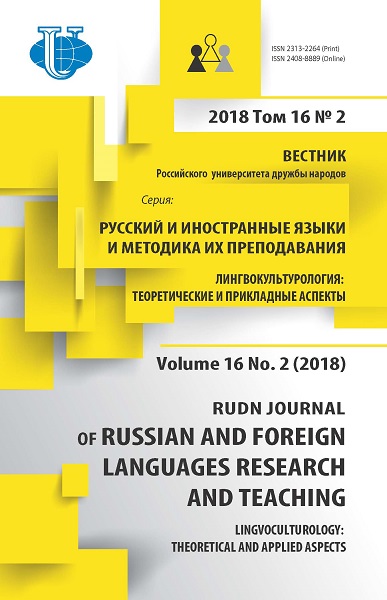The Representation of the Concept “Home/ Fatherland” (Based on Russian and Armenian Proverbs)
- Authors: Gasparian N.K.1
-
Affiliations:
- Immanuel Kant Baltic Federal University
- Issue: Vol 16, No 2 (2018): LINGVOCULTUROLOGY: THEORETICAL AND APPLIED ASPECTS
- Pages: 207-223
- Section: Page of a young scientist
- URL: https://journals.rudn.ru/russian-language-studies/article/view/18558
- DOI: https://doi.org/10.22363/2313-2264-2018-16-2-207-223
- ID: 18558
Cite item
Full Text
Abstract
Linguistic and cultural analysis of the basic concepts of human external and internal world can reveal national character, national ideas, various cultural ideals reflected in these concepts. The concept “Home/Fatherland” is one of the key concepts in the worldview of Russians and Armenians. The author analyses the concept “Home/Fatherland” as a means of representing reality in national consciousness comparing two linguistic pictures of the world. We know that a concept contains important cultural information, concealing its direct meaning in a linguistic unit. The article presents the results of comparative linguistic and cultural analysis of the concept “Home/Fatherland” on the material of the two languages paremiology. The proverbs and sayings gave the author the opportunity to identify the similarities and differences in Russian and Armenian perception of the Home/Fatherland and to determine national and cultural specificity of the concept “Home/Fatherland”.
About the authors
Nina Karapetovna Gasparian
Immanuel Kant Baltic Federal University
Author for correspondence.
Email: ninka24235@mail.ru
PhD student of the Institute of Humanity FGAOU VO «Immanuel Kant Baltic Federal University». Research interests: cultural linguistics, linguistic picture of the world, comparative analysis of Russian and Armenian concepts
14, Alexandra Nevskogo str., Kaliningrad, 236016, Russian FederationReferences
- Agayan, Ye.B. Explanatory Dictionary of the Modern Armenian Language. Retrieved October 24, 2017 from: http://www.nayiri.com (in Armenian).
- Vezhbitskaya, A. (1993). Semantika, Kul’Tura i Poznanie: Obshhechelovecheskie Ponyatiya v Kul’Turospetsifichnykh Kontekstakh [Semantics, Culture and Cognition: Universal Human Concepts in Culturally Specific Contexts]. THESIS. 3. (In Russ).
- Vereshchagin, E.M., & Kostomarov, V.G. (1983). Yazyk i Kul’Tura [Language and Culture]. Moscow: Slovo Publ. (In Russ).
- Vorkachev, S.G. (2006). Slovo «Rodina»: Znachimostnye Sostavlyayushchiye Lingvokontsepta [The Word «Fatherland»: Significant Components of Linguistic and Caultural Concept]. Voronezh: VGU Publ. (In Russ).
- Gabdullina, S.R. (2004). Kontsept Dom/Rodina i Ego Slovesnoe Voploshchenie v Individual’Nom Stile M. Tsvetaevoi i Poezii Russkogo Zarubezh’Ya Pervoi Volny [The Concept Home/Fatherland and Its Verbalization in the Individual Style of M. Tsvetaeva and The Poetry of the Russian Emigrants Of The First Wave]. [Author’s abstr. cand. ped. diss.]. Moscow. (In Russ).
- Dal’, V.I. (1997). Poslovitsy, pogovorki i pribautki russkogo naroda [Russian Proverbs, Sayings And Bywords]. Saint Petersburg: Litera; VIAN Publ. (In Russ).
- Dal’, V.I. (1980). Tolkovyi Slovar’ Zhivogo Velikorusskogo Yazyka [Explanatory Dictionary of the Living Great Russian Language]. Moscow: Russian Language Publ. (In Russ).
- Dzhaukyan, G. Etymological Dictionary of the Armenian Language. Retrieved October 24, 2017 from: http://www.nayiri.com
- Dzhunusov, M.S. (2002). O Mere Svoeobraziya Natsional’Nykh Kul’Tur [About The Measure Of National Cultures’ Specifics]. (In Russ).
- Efremova, T.F. (2002). Novyi Slovar’ Russkogo Yazyka. Tolkovo-Obrazovatel’Nyi [The New Dictionary of the Russian Language. Explanatory And Educational]. Moscow: Russian Language Publ. (In Russ).
- Kolesov V.V. (2004). Mental’nost’ i slovo. Puti i Istochniki Izucheniya Russkoi Mental’Nosti [The Mentality and Word. The Ways and Sources to Study the Russian Mentality]. Lipetsk. (In Russ).
- Maksimov, S.V. The Devilry, Unknown and Cross Force. Retrieved October 29, 2017. from: https://www. litmir.me/br/?b=199138
- Malhasyanc, S. (1999). Explanatory Dictionary of the Armenian Language. Retrieved October 24, 2017. from: http://www.nayiri.com
- Ozhegov, S.I., & Shvedova N.Yu. (1999). Tolkovyi Slovar’ Russkogo Yazyka: 80000 Slov i Frazeologicheskikh Vyrazhenii [Explanatory Dictionary of the Russian Language: 80000 Words and Phraseological Expressions]. Moscow: Azbukovnik Publ. (In Russ).
- Popova Z.D., Sternin I.A. (2007). Semantiko-Kognitivnyi Analiz Yazyka [The Semantic and Cognitive Analysis Of Language]. Voronezh. (In Russ).
- Sreznevskii, I.I. Materials for the Dictionary of the Old Russian Language from Written Monuments. Retrieved October 27, 2017. from: http://oldrusdict.ru/dict.html#
- Stepanov, Yu.S. (2004). Konstanty. Slovar’ Russkoi Kul’Tury. Opyt Issledovaniya [Constants. Dictionary of Russian Culture (Russian Edition)] Moscow: Shkola «Yazyki russkoi kul’tury» Publ. (In Russ).
- Strel’chuk, E.N. (2016). Formirovanie Russkoi Rechevoi Kul’Tury Inostrannykh Bakalavrov Negumanitarnykh Special’Nostei v Vuzah RF [Forming Russian Speech Culture of Foreign Bachelors of Non-Humanitarian Specialities in Higher Education Institutions of the Russian Federation] (Doctoral dissertation, Moscow). (In Russ).
- Sukiasyan, A.M. Explanatory Dictionary of Armenian Synonyms. Retrieved October 25, 2017. from: http://www.nayiri.com/
- Ter-Minasova, S.G. (2000). Yazyk i Mezhkul’turnaya Kommunikatsiya [The Language and Intercultural Communication]. Moscow: Slovo Publ. (In Russ).
- Fasmer, M. Etymological Dictionary. Retrieved October 22, 2017. from: http://www.slovorod.ru/etymvasmer/index.html
- Frumkina R.M. (1992). Kontsept, Kategoriya, Prototip [Concept, Category, Prototype]. Moscow: INION RAN Publ. (In Russ).
Supplementary files














